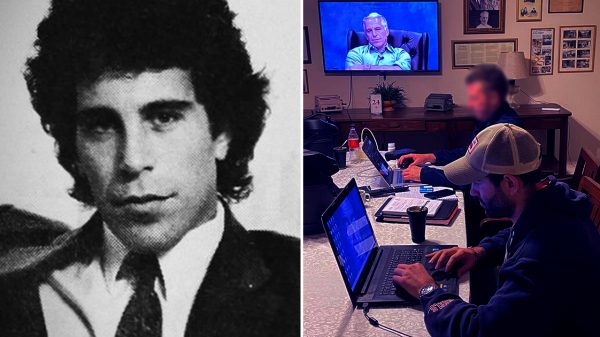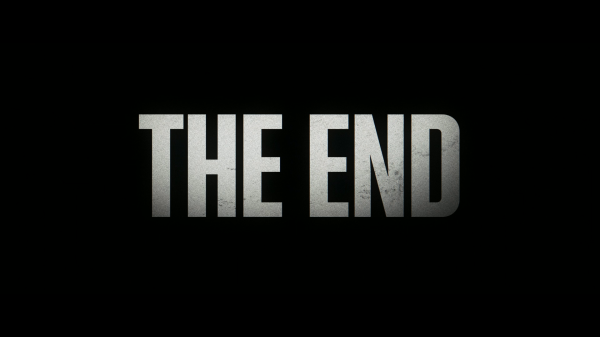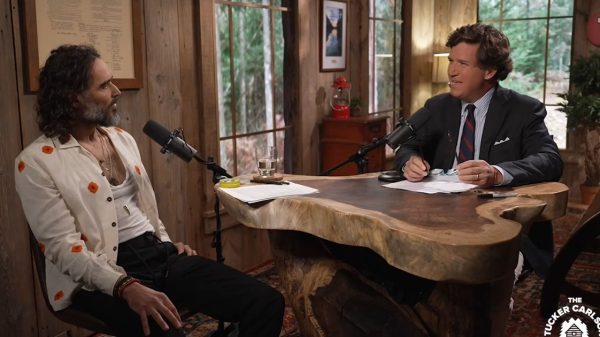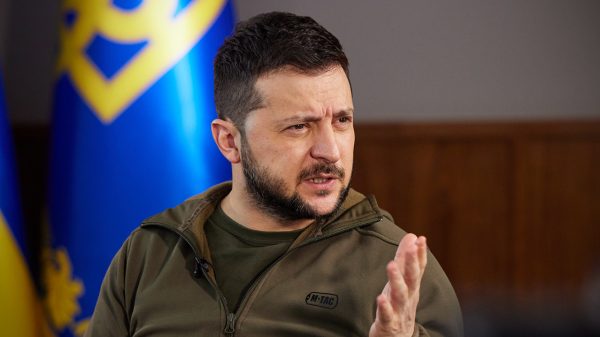Bottom Line Up-Front: “Sound of Freedom” is the best film America has produced in years, despite the best efforts of Hollywood to bury it. It’s not a Qanon conspiracy rant, overbearing Christian sermon, American power fantasy or graphic torture porn. It’s a unique phenomenon crafted with intense love and faith by a majority-Latin-American cast and crew.
From the buzz on the Internet about “Sound of Freedom”, one would imagine it is either a patriotic American action movie epic with intense Christian overtones or a deranged Qanon-influenced piece of propaganda designed to provoke violence against minorities.
It is neither of these things. “Sound of Freedom” is a gritty, brutally-honest Latin-American crime drama in the vein of Brazilian director José Padilha’s “Narcos”, “Tropa De Elite” or “Bus 174”, brought to life by veteran Mexican director Alejandro Gómez Monteverde, who co-wrote the film with screenwriter Rod Barr.
It tells a true story from the extremely real world of child sex trafficking with gut-wrenching and tear-jerking emotional force, but stays well short of the “creepy line” which modern Hollywood frequently crosses. Brilliant cinematography spares the viewer’s eyes from the sights and sounds of children being abused, while not being shy about the fact that abuse has happened, is happening and will continue happening off-camera.
In other words: children are raped, tortured and kept in inhuman conditions; but by the grace of God and good filmmaking you don’t have to see or hear it.
When asked by the Daily Signal about whether “Sound of Freedom” actually shows children being molested, Tim Ballard – the real-life inspiration for the film – responded curtly, “I demanded they didn’t. Don’t make pedophilia material here.”
So instead of watching and hearing a video of a child being raped that was confiscated by police, we see the bloodshot eyes of Jim Caviezel (“The Passion of the Christ”) water and twitch as he types what is happening off-screen for an official report; an unflinchingly-honest representation of what real law enforcement officers endure when forced to watch graphic child pornography in order to get justice for the children exploited in them.
Compare and contrast to Netflix’s “Cuties”, which purported to be a film against the hyper sexualization of preadolescent girls but whose camera focused incessantly on their sex organs.
Help us help children by going to our website and joining our America’s Future team today. This is one way to get involved. https://t.co/fuC22tZ1Dn https://t.co/nP2LmN9B4l pic.twitter.com/sBYJIS0MNN
— General Mike Flynn (@GenFlynn) July 13, 2023
The Christian overtones are actually quite understated as well. While it is clear that the film was made by devout Christians, only three lines in the film are directly religious: one quotation of Luke 17:2; one statement of “God’s children are not for sale”; and the final line in a brief story about a cliff’s-edge near-suicide that turned into a religious conversion.
And far from being a jingoistic power fantasy about an American action hero saving the world’s children from foreign criminals, “Sound of Freedom” is brutally clear that – as the premier child sex predators and top consumers of child porn on the planet – Americans have nothing to brag about in the fight against human trafficking. The American federal government is not remotely portrayed as an unmitigated force for good, either.
“Sound of Freedom” tells the true story, with very forgivable deviations, of Homeland Security Special Agent Tim Ballard’s decision to leave the Department and go rogue after being ordered to cease Operation Triple Take, which went on to arrest five leading Colombian human traffickers and save 123 trafficking victims, including 55 children.
Official policy at the time was that operations overseas could only continue if there were clear American perpetrators or American victims. This changed partly due to Ballard’s bombshell testimony to Congress in 2015 about how this approach hamstrung efforts to tackle child trafficking as a networked function of organized crime.
A complete list of the film’s deviations from reality can be found on Provo-based Christian distributor Angel Studios’ website. Surprisingly, most of the film’s creative choices were shying back from reality, not embellishments. The climactic scene of a police raid on a private island was actually just one of three simultaneous raids across Colombia. Moreover, the Colombian operation took place at the same time as another one in Haiti. In another example, one character who confesses to having had sex with an underaged prostitute actually slept with the prostitute’s adult mother in real life, whose story lead to his literal come-to-Jesus moment.
One surprising and understandably-cut facet of the story is that conservative personality Glenn Beck actually funded the rescue operation in real life.
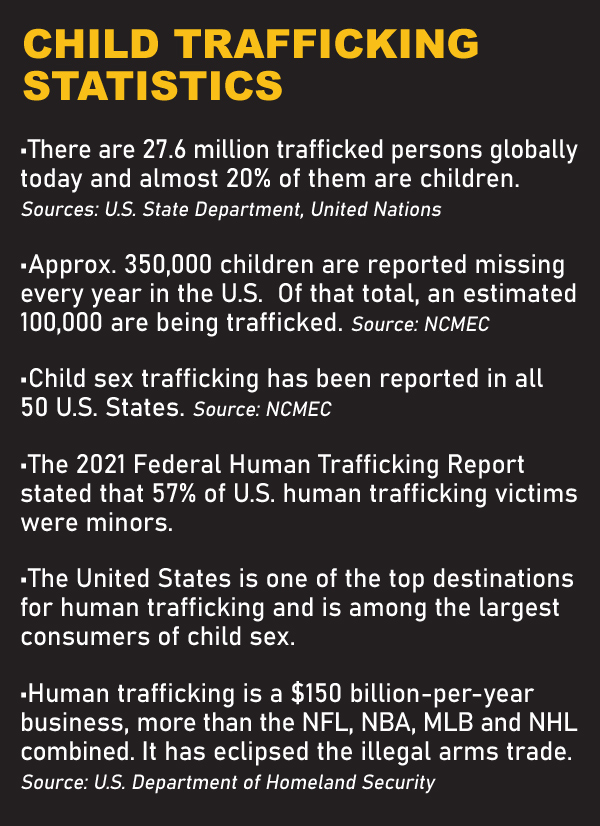
This graphic is free to share. No attribution is necessary.
One exception to the trend of un-embellishment is the scene where Ballard speaks to his wife Katherine – played by Mira Sorvino – and tells her he plans to quit DHS, then mount a private rescue operation for the children instead of continuing his career as a federal agent. According to a wide-ranging interview with the Daily Signal where Ballard spoke bluntly about how transgender ideology and open border policies are worsening child sex trafficking, that conversation happened much differently:
What she really said to me—because they didn’t want to make me look like the coward that I was, because I was saying, “I’m coming home. I’m not going to do this. I’m not going to be part of this.”
And she said to me, very sternly, and she’s usually pretty sweet, but this is righteous indignation at its finest—and this is a quote because it was that powerful and it pierced my heart when she said it. She said, I quote, “I will not let you jeopardize my salvation by not doing this.”
It breaks my heart because not only is she losing our income, but she, possibly, very good chance, maybe 50/50, she’s going to lose me. She’s willing to risk becoming a widow…
Performances were solid all around, with Bill Camp’s Vampiro – whose real-life nom-de-guerre is actually Batman – making a compelling performance as a burnt-out gangster turned rogue-emancipator. Kurt Fuller’s turn as Ballard’s long-suffering DHS supervisor gets the job done, even though the script gives him little to work with.
One cannot envy Casting Director Deanna Brigidi’s job of hiring children who can convincingly play child rape victims, nor Monteverde’s job of directing those children in those roles, but they were undeniably extraordinarily successful. Getting child actors to play convincing roles is difficult even with the tamest of scripts, but there is no point in the movie where their performances broke verisimilitude.
Caviezel’s Ballard is almost too stoic, brooding and intense; which one would think is a conscious decision to model the real-life Ballard, except in real-life interviews Ballard is clearly outspoken, passionate and emotionally-vulnerable. The creative choice is confusing, but Caviezel’s slightly wooden combination of thousand-yard-stare, twitchy muscles and eyes brimmed with tears may present a perspective on law enforcement officers that audiences identify with.
Perhaps, though, Caviezel’s portrayal is an accurate portrayal of how Ballard views himself. He was the one who insisted Caviezel be the first actor pitched to play him in the film.
The script itself is solidly even with believable dialogue, and only minor hiccups. The wind-up to the film’s tagline “God’s children are not for sale” is exceptionally blunt, if not entirely ham fisted.
Thematically there are not-too-heavy-handed notes which subtly invoke the fight against slavery in the 19th century, which is the inspiration for Ballard’s real-life anti-trafficking nonprofit Operation Underground Railroad. One heartbreaking scene where a trafficked little boy insists that his name is “Teddy Bear” feels like a very understated and respectful homage to Kunta Kinte in “Roots”.
Special mention is deserved for the haunting score and soundtrack, which elevates but never upstages the action on screen. Most of it is in Spanish, so some of the nuance is lost for purely Anglophone viewers, but it shouldn’t be a deal-breaker.
As of July 15, “Sound of Freedom” has broken into the top 20 films of 2023, grossing $65,989,757 just a week and a half after release. With viral word-of-mouth driving even more viewers to theaters, it is poised to imminently beat mainstream Hollywood big-budget flops like Disney Marvel’s The Flash and Disney Pixar’s Elemental. “Sound” is already beating “Indiana Jones and the Dial of Destiny” on a per-theatre basis.
Angel Studios has created a “Pay It Forward” program for fans to pay for free tickets for those who cannot afford them. That effort has raised over $91 million so far, which clearly isn’t reflected in the box office total. Assuming the majority of those free tickets have not been used, they may have already beaten “Indiana Jones” and entered within striking distance of “John Wick 4”.
Caviezel and others associated with the production have alluded to Disney having tried to prevent the film from being released for five years, but have offered little in the way of details. The company has come under intense public scrutiny after promoting sexual education in public elementary schools, with one executive having gone viral for discussing how she frequently inserts her “not-so-secret gay agenda” into children’s films and television.
Mainstream press have described the film as “controversial” but, after investigating left-wing misgivings to their roots, the only coherent complaint they have is that Ballard once echoed concerns about the Wayfair scandal, where alleged bugs in a pricing algorithm produced listings for furniture with children’s names costing tens of thousands of dollars. Other griping includes that he’s a conservative, associates with conservatives and believes that online memes about human trafficking – even from QAnon – can be a way to spread awareness of the problem.
Ballard eventually conceded that, after investigation, the suspicious listings were not indicative of human trafficking, but that the situation was legitimately suspicious at the outset. “I can tell you from 17 years of experience that absolutely children are bought and sold online,” Ballard told Vice News. “Either through social media platforms or various websites, it is happening. It is a very real thing that people need to be aware of.”
This writer watched “Sound of Freedom” in Bethesda, Maryland – one of the wealthiest, whitest and most liberal jurisdictions in the country – over a week and a half after release. The theater was packed, with the only available seats at showtime on the very front row. After credits rolled, a cursory glance at the packed house showed that roughly half the audience was non-white and a third of them were speaking Spanish. One elderly man said, in Spanish, to his wife, “I had no idea. People need to know about this.”
“Sound of Freedom” is a lot of things, but none of them what you’d expect.




